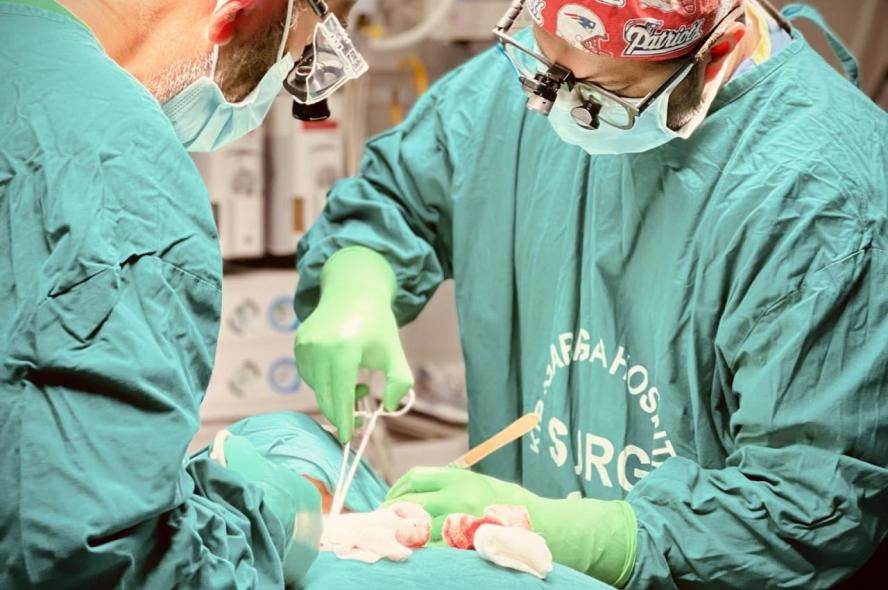-
About
- Departments & Offices
-
Academics
- Public Health
- Biomedical Sciences
- Physician Assistant
- Special Master’s (MBS)
-
Admissions & Financial Aid
- Tuition & Fees
-
Student Experience
-
- Student Resources by Program
- Academic & Student Support
- Wellness & Wellbeing
- Student Life
- Events & Traditions
-
-
Research
- Research Labs & Centers
- Tufts University-Tufts Medicine Research Enterprise
-
Local & Global Engagement
- Pathway & Enrichment Programs
- Global Health Programs
- Community Engagement
Helping Patients Overcome the Shame of Goiters in Rwanda
Faculty from Tufts University School of Medicine have made more than a dozen trips to perform lifesaving surgeries and heal the physical and social effects of the condition

The stigma associated with having a goiter is so great in Rwanda that people who live with them have been known to walk for days to have them surgically removed.
A goiter results when the thyroid gland enlarges—sometimes dramatically—causing a noticeable lump on the neck. The primary cause of goiters in the developing world is iodine deficiency. (In the United States and other developed nations, iodine is in table salt and added to some foods as well.)
In 2005, otolaryngologist Jagdish Dhingra, associate professor at Tufts University School of Medicine, launched the Rwanda Goiter Surgery Program. “When we started the program, the country was still recovering from the aftershock of the genocide of 1994,” says Dhingra. “The task felt overwhelming and appeared almost impossible. It took us three consecutive missions over two years to get the program off the ground and create a safe enough environment for us to do our first surgery under general anesthesia.”
Since then, Dhingra and a team of physicians and residents from the Department of Otolaryngology (Head + Neck Surgery) at Tufts Medical Center have made 14 trips to Rwanda. They stay in the country for a week and perform an average of 20 to 30 goiter surgeries at no cost to patients; the program is advertised on the radio and on social media by a local liaison.
“In this area, people often think a goiter is a sign of being possessed by evil,” says otolaryngologist Ameer Shah, A07, M13, assistant professor at Tufts University School of Medicine. “A lot of young people can’t get married, have families, and lead a normal life because they’re ostracized. Some local shamans do sham procedures where they burn the front of the neck.”
Large goiters can also cause serious physical complications, including swallowing and breathing issues. “A lot of these patients are laborers, and it can be taxing on them,” says Shah, “so it's a problem from a medical and a social standpoint.”
The surgery itself takes around two hours in most cases. Shah says it is typically a “one-and-done” type of surgery and the benefits tend to be immediate. However, large goiters tend to be very vascular (meaning they have a very robust blood supply), so there is a risk of bleeding.
“Our surgeons are operating on a large mass close to the airway,” says Shah. “The nerve that controls your voice actually runs right underneath the thyroid. So, we have to find that nerve and dissect it out and save it.”
In the United States, Shah explains, physicians have access to sophisticated equipment that allows them to stimulate and monitor the nerve as they’re operating.
“We don't have that equipment there, so we have to use our knowledge of anatomy and take our time and follow these nerves very closely as we're doing the surgery. It also challenges us to be better surgeons and not rely on things that we fall back on here.”
Over the years, the team has established collaborations with hospitals in Rwanda and worked closely with the local doctors and medical residents. Shah says the continuity is an important aspect of the program and makes things go more smoothly each time they go on a mission. It also allows them to follow up with previous patients and perform the surgery on those who were not able to receive it in the past.
The next step, says Dhingra, is to use remote learning to help the team’s Rwandan colleagues become independent in performing these complex surgeries safely.
“We have come across many hurdles and learned to overcome them,” says Dhingra. “We have developed and described new techniques to make the surgery in these low resource settings safer. In the next five to 10 years, our aim is to become redundant and develop mutual collaborations with our Rwandan colleagues and not have them become dependent on us.”
Shah says the personal rewards of participating in the program are great. He recalls a patient who walked from Congo (a neighboring country) to have a goiter removed.
“It was probably a treacherous journey for him,” says Shah. “He had a huge goiter that was up near his ear and crossed all the way over to the other side. He told us how he basically had no life because he was ostracized, kind of cast away. He was not able to get married.”
Shah says the team was a little bit nervous about inserting a breathing tube, given the size of the goiter. “It was an all-hands-on-deck type of surgery, and it went great,” he says.
The first day after the surgery, Shah says the man had “the biggest smile I've ever seen on anyone's face. He said, ‘I can have a life now.’
“It was one of those moments where you remember why you're a physician and why you're taking time away from your family and your personal life to go to another country. It was really special,” Shah recalls.
Department:
Otolaryngology / Head and Neck Surgery